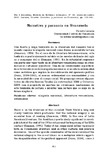| dc.rights.license | http://creativecommons.org/licenses/by-nc-sa/3.0/ve/ | |
| dc.contributor.author | Lecuna, Vicente | |
| dc.date.accessioned | 2013-01-15T14:08:58Z | |
| dc.date.available | 2013-01-15T14:08:58Z | |
| dc.date.issued | 2013-01-15T14:08:58Z | |
| dc.identifier.issn | 1315-8392 | |
| dc.identifier.uri | http://www.saber.ula.ve/handle/123456789/36302 | |
| dc.description.abstract | Una fuerte y larga tradición de la literatura del llamado tercer
mundo supone la alegoría nacional como forma esencial de lectura
(Jameson, 1986). En el caso de la literatura latinoamericana, esta
tradición es particularmente notable en las novelas de fi nales del siglo
XIX y comienzos del XX (Sommer, 1991). En la actualidad reaparece
con particular vigor tanto en la literatura venezolana como en otros
discursos culturales y políticos. Una de las coordenadas específi cas
de esta versión local de la alegoría nacional es el uso de la enfermedad
como metáfora que implica la descalifi cación del oponente político
(Duno, 2009-2010), al asociar enfermedad con anormalidad y con
la necesidad de curar el cuerpo social. Me propongo revisar algunos
textos de Alberto Barrera Tyszka (La enfermedad, 2006 y Crímenes,
2009) con el propósito de mostrar las severísimas limitaciones de
esta tradición de lectura e intentar una lectura que se aleje de la
forma alegórica. | es_VE |
| dc.language.iso | es | es_VE |
| dc.rights | info:eu-repo/semantics/openAccess | |
| dc.subject | Alegoría nacional | es_VE |
| dc.subject | Literatura venezolana | es_VE |
| dc.subject | Enfermedad | es_VE |
| dc.title | Narrativa y paranoia en Venezuela | es_VE |
| dc.title.alternative | Narrative and Paranoia in Venezuela | es_VE |
| dc.type | info:eu-repo/semantics/article | |
| dc.description.abstract1 | There is in the literature of the so-called Third World a long and
sturdy tradition which postulates that the national allegory is an
essential form of reading (Jameson, 1986). In the case of Latin
American literature, this tradition is particularly signifi cant in novels
published at the end of the 19th century and the beginning of the 20th
century (Sommer, 1991). Today it has reappeared rather vigorously
both in Venezuelan literature and in other cultural and political
discourses. One of the specifi c coordinates of the local version of the
national allegory is the use of illness as a metaphor which suggests
the disqualifi cation of the political opponent (Duno, 2009), since it associates illness with abnormality and with the need to heal the
social body. I shall look closely at some texts by Alberto Barrera
Tyszka (La enfermedad, 2006 y Crímenes, 2009) in order to show the
very severe limitations of this tradition of reading and to attempt a
reading which is not allegorical. | es_VE |
| dc.description.colacion | 151-161 | es_VE |
| dc.description.email | vicentelecuna66@yahoo.com | es_VE |
| dc.description.frecuencia | Anual | |
| dc.identifier.depositolegal | PP89-0023 | |
| dc.subject.dependencia | Maestría en Literatura Iberoamericana | es_VE |
| dc.subject.facultad | Facultad de Humanidades y Educación | es_VE |
| dc.subject.keywords | National allegory | es_VE |
| dc.subject.keywords | Venezuelan literature | es_VE |
| dc.subject.keywords | Illness | es_VE |
| dc.subject.publicacionelectronica | Voz y Escritura. Revista de Estudios Literarios | |
| dc.subject.seccion | Voz y Escritura. Revista de Estudios Literarios: Artículos | es_VE |
| dc.subject.thematiccategory | Artes y Humanidades | es_VE |
| dc.subject.tipo | Revistas | es_VE |
| dc.type.media | Texto | es_VE |


